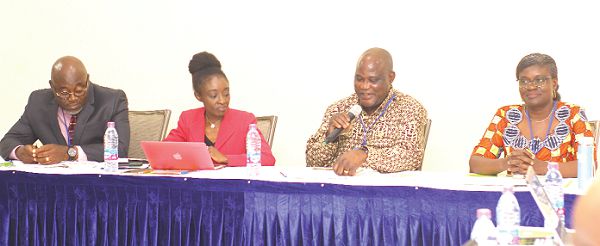
‘Coastal erosion taking toll on country’s shorelines’
The government has committed more than $200 million to tackling coastal erosion in hotspots in communities across the country, the Minister of Environment, Science, Technology and Innovation, Professor Kwabena Frimpong-Boateng, has stated.
Out of the amount, he said, $150 million had been committed to the Western Region, where a number of coastal communities were bearing the brunt of coastal erosion.
Coastal erosion
In a speech read on his behalf at a workshop in Accra yesterday, Prof. Frimpong-Boateng said coastal erosion was taking its toll on the country’s shoreline and, as a result, Ghana was losing about 2.7 square metres of shoreline annually to sea erosion.
The two-day workshop, which is being organised by the UN Department of Ocean Affairs and the Law of the Sea (DOALOS) and the Environmental Protection Agency (EPA), is in support of the second cycle of the UN regular process for global reporting and assessment of the state of the marine environment.
It has brought together some marine and environmental experts from the South Atlantic Sea Board to collate data and information to support the preparation of the second Global Report on the state of oceans.
Solutions
“The cost to coastal infrastructure is enormous and the government is committed to finding innovative ways of halting shoreline recession,” Prof. Frimpong-Boateng said.
He said in an effort to address coastal erosion in the country, the government was seriously considering a mix of hard and soft engineering solutions to deal with the problem.
“This will mean protecting coastal habitats such as mangroves, rocky shores and rock pools, while putting in place hard structures where needed,” he said.
He stated that coastal cities, which had naturally become the major population nodes, attracted most of the commercial and industrial activities, while the demands of increasing commerce and industrialisation had imposed great pressure on the sea and its resources.
“We see intensification of fishing, shipping, hydrocarbon activities, ports development and conversion of sensitive marine and coastal habitats in the quest to create wealth and deliver human well-beings,” the minister said.
Prof. Frimpong-Boateng added that the upsurge in those activities and the manner in which they were being pursued were increasingly causing a degradation of sensitive ecosystems, pollution, depletion of living marine resources, coastal erosion and other effects of climate change.
For instance, he said, the South Atlantic and the wider Caribbean were at the moment experiencing the scourge of the influx of the seed weed, sargassum, with its attendant disruptive effects on fishery, coastal tourism and, more importantly, the livelihoods of coastal communities.
Human-induced effects
The acting Executive Director of the EPA, Mr John A. Pwamang, for his part, said human activities had taken a toll on ocean resources, compromising the ocean’s ability to spur economic growth and wealth.
He said an estimated 150 million tonnes of plastic had accumulated in the world’s oceans, while approximately five to 13 million tonnes of plastic were added every year.
He, therefore, expressed happiness at the fact that the world had committed to halting and reversing the decline in the health and productivity of the ocean and its ecosystems to restore its resilience and ecological integrity through the Sustainable Development Goals and other multilateral and environmental agreements.
A representative of the UN Division of Oceans Affairs and the Law of the Sea, Ms Vita Owuasanya, said the assessment workshop should support policy development and decision-making at the national, regional and global levels.
She said it would, among others, play a decisive supporting role for ocean-related inter-governmental processes, including the 2030 agenda for sustainable development.
